Social Media Can You Avoid It
Why you might desire to consider quitting social media
Social media is riddled with contradictions. It tin can be fun but also infuriating. It can brand you feel less alone, but as well trigger feelings of isolation and inadequacy. And can we talk about the trolls? If you lot're spending a lot of time on social media, or on your telephone in general, it tin can be difficult to imagine life without it. All the same, there are plenty of reasons to consider taking a break from endless scrolling. If y'all're ready to accept the plunge, here are some things to expect when y'all have a break from social media.
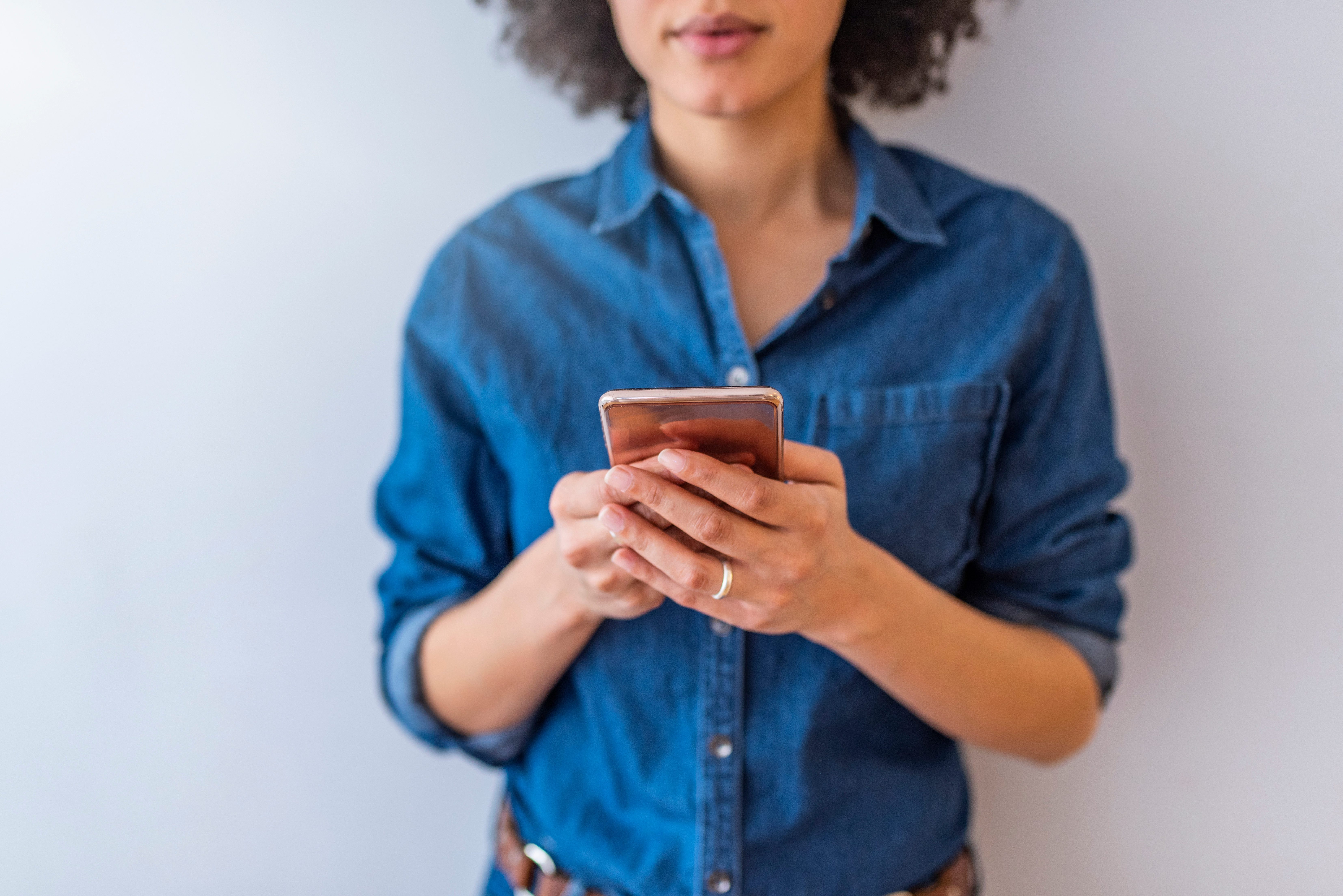
Yous'll get more piece of work done, and y'all'll do it faster
When you don't have to worry well-nigh your devices buzzing left and right, you could find your productivity levels shooting through the roof. "The affair about social media is that it constantly interrupts us," says Joanne Cantor, PhD, professor emerita of communication at the University of Wisconsin-Madison and author of the book Conquer CyberOverload. "When we stop ourselves to bank check social media, again and again, it really becomes another class of multitasking, and multitasking makes whatever you do accept longer, and you practise it in an junior way." In fact, the American Psychological Association estimates that trying to juggle multiple tasks at once—such equally clicking back and along between Facebook and an important projection—may reduce your productive fourth dimension by as much every bit 40 percentage. That's a high price to pay for a few likes and comments.

Yous'll get your creative juices flowing
If you find yourself stuck in a creative block, it might have something to do with your social media habits. Cantor says the key to an imaginative mind is taking breaks every now and then while you lot work with something other than social media. "Having that social media in the background and calling to you and asking you things interferes with your creativity," Cantor says. By giving upward social media entirely, yous rid yourself of these nagging notifications and allow your creativity to flourish.
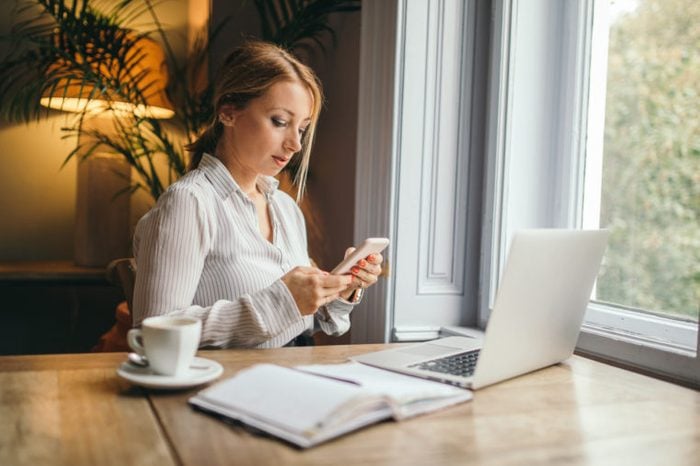
You might feel anxious at first
While the effects of quitting social media are generally positive in the long run, your firsthand reaction may exist one of stress and feet. These feelings are acquired past a neurobiological withdrawal from the sense of beingness constantly connected. "If you're using social media addictively, which some people are, y'all have elevated levels of dopamine, then when you lot stop doing that, there is some withdrawal," says David Greenfield, PhD, assistant clinical professor of psychiatry at the University of Connecticut School of Medicine and founder of the Center for Internet and Technology Addiction. Luckily, these feelings usually do not persist beyond the showtime few days of quitting social media, and so y'all should be able to bask the positive furnishings soon plenty.
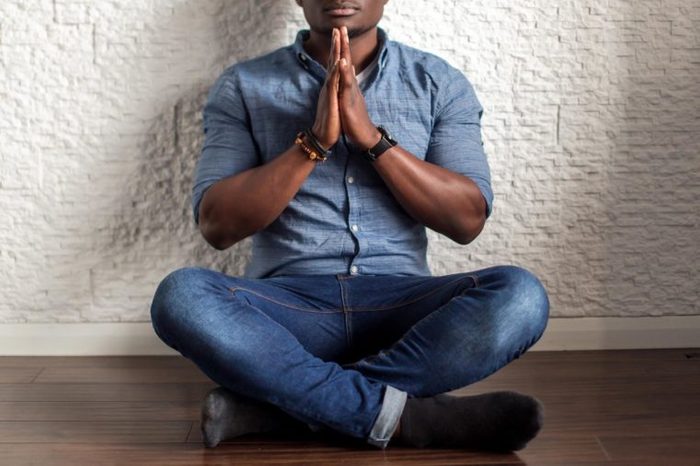
You lot'll experience less stressed
Because social media has become so easy to access anywhere and at any time, nosotros often feel compelled to pay attention 24/7 to what is taking place on our newsfeeds and timelines. Co-ordinate to Greenfield, this impulse to be constantly aware of what's going on online leads to an increase in cortisol, the stress hormone. This heightened stress can bring along a whole slew of unfavorable effects on the brain, such as reduced memory and an increased chance of low. Staying away from social media makes yous less decumbent to such a loftier level of cortisol, leaving you calmer and more focused. Find out more almost the weird ways social media affects your encephalon.

You lot'll experience more than self-assured
When we postal service on social media, we tend to share just the happy, exciting parts of our lives that we want others to see. This may seem harmless, only when we're seeing merely people at their all-time, it'southward like shooting fish in a barrel to experience like we're falling behind past comparison. This tendency to negatively compare ourselves to those who nosotros believe are superior is what psychologists phone call upwardly social comparison. "Allow'southward say you're struggling to have a baby," says Mai-Ly Nguyen Steers, PhD, a postdoctoral fellow and lecturer at the University of Houston. "Normally, people wouldn't come upwardly to yous and say, 'Well await at how astonishing my babe is!' or something like that. Whereas, it kind of feels like that on social media, considering nosotros're posting to such a large audience." A report by Steers and her colleagues found that people who used Facebook more frequently experienced college levels of this social comparison, which was linked to more frequent symptoms of depression among the users. Quitting Facebook and other online accounts tin help block much of this social comparison, and yous'll cease up feeling much happier and more confident. And not comparison yourself to others is one way to attain torso acceptance.
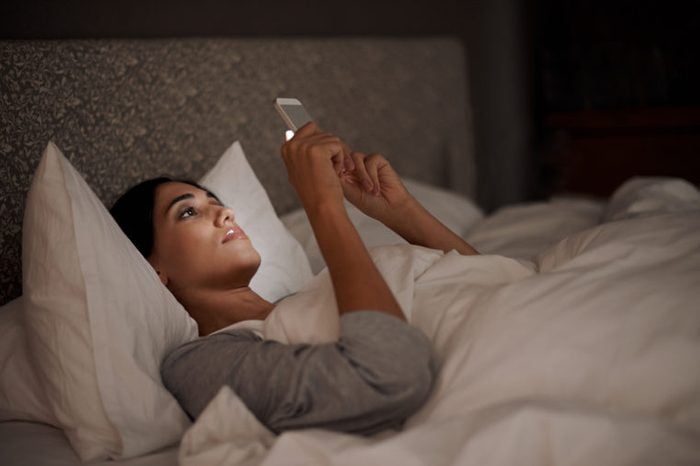
Yous'll get more slumber
Yous accept a quick minute to check 1 notification on Instagram before bed when all of a sudden you realize yous've been browsing, liking, and commenting long by your bedtime. Sound familiar? Greenfield says this has go a common addiction for many people at night, often spending 1 to 2 hours scrolling through social media in bed. "Recollect about information technology: If you lot're doing that every day, that's fifteen hours a week you spend just doing social media," Greenfield says. "That's not like going out to dinner with a friend, that's simply looking at somebody play with their new hamster and so commenting on it." When you quit social media, you complimentary yourself of this extra priority—and buy yourself the powerful health boost of a good night's rest. If you lot demand a cool-downward activity in the p.grand., skip the screens and try something more than relaxing and less time-consuming, like reading a book or planning tomorrow's agenda.

You lot'll strengthen your face-to-face relationships
Certain, social media tin be an excellent way to stay in touch with old friends or family from out of boondocks, only cutting ties with the Internet can work wonders for your tangible friendships. Face-to-face interpersonal relationships are generally much stronger than those conducted solely online, and taking a breather from your social media accounts forces yous to focus on these real-world interactions. "Pulling dorsum on social media and spending more time on face up-to-face interactions really helps your relationships, and relationships are really ane of the almost important factors in wellbeing and mental wellness," Cantor says. (Social media obsession also has this downside.)
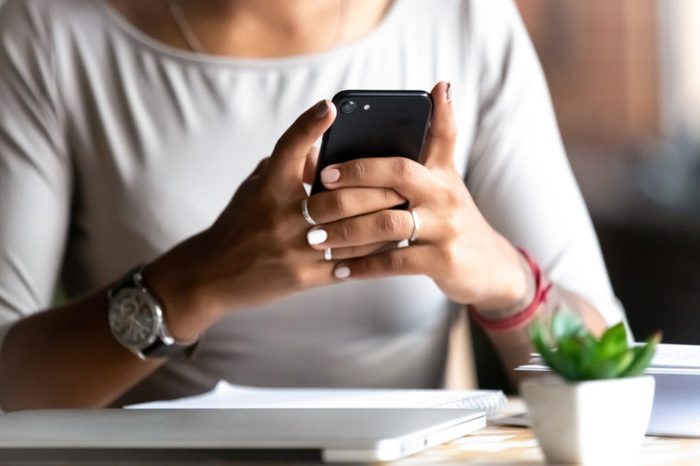
You're less likely to get bored
Who hasn't pulled out their telephone while waiting in line at the grocery shop, thinking a check of your phone could help alleviate the tedium? But researchers at Kent State who studied 41 college students found the opposite consequence. "Amazingly, boredom increased over the 30-minute bout of social media utilize," says Andrew Lepp, PhD, an associate professor at Kent Land University who specializes in the psychology of social media usage. If you're not mindlessly scrolling through your feeds, you lot might choose a more mentally engaging activity to banish your colorlessness, like working on a crossword or reading a book.

You'll sit less
Sitting all twenty-four hour period can be as unsafe for your health as smoking, scientists say. And after a long twenty-four hour period at work, we are increasingly using our free time to cheque social media—from a seated position. "People will say, 'Wow, I didn't realize I was sitting an extra ninety minutes each twenty-four hour period because of Facebook,' " Lepp says. Staying away from social media frees up your time for healthier activities. Just don't replace scrolling with playing video games or binging on Netflix. Acquire the 1ways to have a healthier relationship with social media.

You lot'll acquire more nigh yourself
Once you stop scrolling through other people'south opinions, you volition likely observe out more well-nigh what motivates you, not them. "When people remove themselves from social media, they lose that temptation to garner attention and superficial feedback from other people by posting where they went to dinner or where they went on vacation," says Tom Kersting, LPC, a licensed psychotherapist, and family counselor and author of Disconnected: How to Reconnect Our Digitally Distracted Kids. "That need to be relevant in the eyes of others will lose its grip, leading to the discovery of one'southward self."

Your decision-making skills will improve
Many people'southward beliefs and values are influenced by what they read on social media. According to a study from Pew Research, half of Facebook users become their news from just from the site. "A lot of the decisions people are making isn't about thinking, it'southward a collective consciousness," Kersting says. Remove yourself from social media and you'll learn how to think more and make decisions and choices independently.

You lot'll argue less
It'southward much easier to type a scathing remark when you're hiding backside a screen than hurling an insult when you're in the same room as someone. But when you stop using social media, yous're taking yourself out of the fray and you'll exist less emotionally charged. "So you don't have to comport around with you all day what y'all're pissed off near that someone posted," Kersting says.

You'll develop more emotional intelligence
Ditching social media may not only make you a nicer person, just it could also assist you develop your emotional intelligence, a valuable skill in the workplace. Just it does require that you, aye, interact with other human beings. "When we're on a reckoner screen for hours a day, and so we're removing the possibility of having contiguous interaction and we're reducing our emotional intelligence," Kersting says. Lifting your caput from the screen and having existent conversations can increase the quality of your relationships and assistance you develop this disquisitional skill.
Sources
- Joanne Cantor, PhD, professor emerita of communication at the University of Wisconsin-Madison and author of the book Conquer CyberOverload
- American Psychological Clan: "Multitasking: Switching costs"
- David Greenfield, PhD, assistant clinical professor of psychiatry at the University of Connecticut School of Medicine and founder of the Center for Internet and Technology Addiction
- Mai-Ly Nguyen Steers, PhD, a postdoctoral fellow and lecturer at the Academy of Houston
- Andrew Lepp, PhD, an associate professor at Kent State University who specializes in the psychology of social media usage
- Tom Kersting, LPC, a licensed psychotherapist and family unit counselor and writer of Disconnected: How to Reconnect Our Digitally Distracted Kids
- Pew Research Centre: "Half of Facebook news users get news from that social media site alone; other audiences rely on multiple sites"
![]() Medically reviewed past
Medically reviewed past
Originally Published: August x, 2018
Comments
Post a Comment